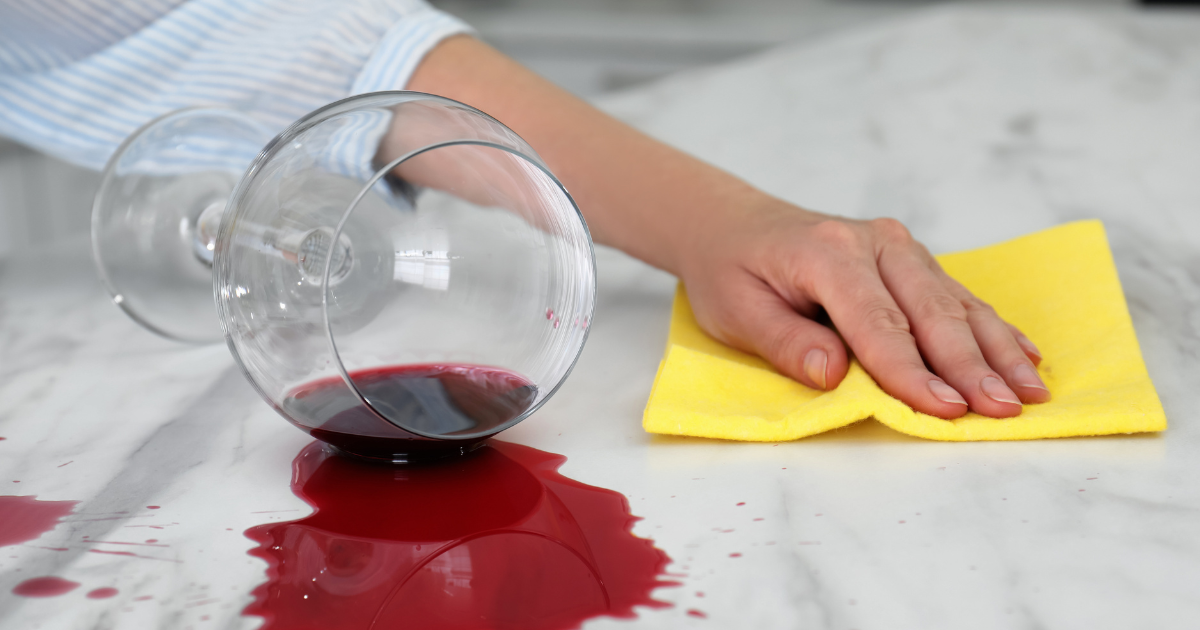How To Remove Red Wine Stains From Marble

In this article I will go over how to remove red wine stains from marble. Do you have shiny marble surfaces like floors or countertops in your home? If yes, it is important to maintain these surfaces and keep the shine in them forever. Protecting them from stains, especially the set-in and dried stains, is very important, as these can cause damage to marble, if not cleaned immediately.
However, here we give you some tips wherein you can use simple ingredients to clean the stains on marble easily, without damaging the material. Keep reading to learn about these effective DIY techniques that help to keep the shine in your marble surfaces forever.
How do you get red wine stains out of marble floors?
While marble walls and countertops may be fairly easy to clean, marble floors may present you with some challenges when cleaning red wine and other stains. The surface area of marble floors is large, and not cleaning the stains properly can impact a large area. So, if you have been wondering, “How do you get red stains out of white marble”, the following section is for you.
Using baking soda
- Using a soft cloth, dab the stains gently to remove as many marks as possible.
- Clean the surface by spraying a small quantity of water.
- Make a thick paste of baking soda and water. Apply the paste on the affected areas on the marble floors.
- Seal the paste-covered floors with a plastic wrap. Leave it on for about 24 hours.
- This time will allow the baking soda to dry and lift the wine stains completely.
- After removing the wrap, clean the floor with some water and liquid soap to notice that the red wine stains have gone off.
- Repeat the process if you notice some stubborn wine stains on the marble floors.
Using detergent and flour
- Make a thick paste by mixing a cup of flour and about 3 tablespoons of liquid detergent or soap.
- Cover the stain-affected areas with this paste and cover it with a plastic wrap. Leave it on for 24 hours.
- After 24 hours, remove the wrap, and wash the area with water and some liquid soap. The stains would have lifted completely by now.
- However, if you still notice stubborn red wine stains remaining on the floors, you can repeat this process.
Using rubbing alcohol
- Pour about 1/8 cup of rubbing alcohol into a spray bottle. Mix a few drops of liquid soap in the bottle and shake the contents well.
- Spray this mixture on the red wine stains on the marble floors, and let it remain for about 15 minutes.
- After 15 minutes, wash the area with water and mild soap to see that the stains have lifted completely.
Using cornstarch
- Make a thick paste by mixing cornstarch and water.
- Apply this paste on the stain-affected areas on the marble floors.
- Let the paste remain on the floors for about 24 hours, after which, you can wash off the area with water and mild soap.
- The stains would have vanished completely by now, but you can repeat the process if you notice any stubborn red wine stains.
How to remove red wine stains from marble countertops
You cannot avoid spillage of red wine on your marble countertops, especially when you have lots of friends and relatives at your place. When you notice the bright red stains on the sparkling white marble countertops, it is quite natural to get stressed. However, cleaning these stains is quite easy if you use the right product.
For cleaning marble countertops, you can use any oxygenated, non-abrasive cleaner that is specifically designed to clean marble surfaces. You can also use hydrogen peroxide in the following way to get rid of red wine stains from marble countertops easily:
- Use a sponge or clean cloth to dab on the stains gently to lift as many marks as possible.
- Clean and dry the marble countertops thoroughly.
- Soak a thick towel well in a solution of hydrogen peroxide. Use this towel to cover the stained areas on the marble countertops.
- Use a clean, plastic wrap to cover the thick towel. Arrange a stack of books over the wrap to ensure that the weight is uniformly spread over the towel.
- Let the books remain on this hydrogen peroxide-soaked towel for about 24 hours. After 24 hours, remove the books, plastic wrap and towel.
- Rinse with water and mild soap to see that the stains have lifted almost fully. Repeat the steps if you notice any stubborn stains.
After reading all these tips, you will have definitely found the answer to the question, “How to remove red wine stains from marble kitchens”. Is it possible to remove all stains from the marble? Let’s see below:
Are there any stains that cannot be removed from marble?
While there are ways to remove all kinds of stains from marble, some stains are more difficult than others to remove. Some of the most challenging types of stains on marble floors and countertops are:
Water stains – Over a period of time, water deposits can build up on the marble, and cause damage to its material. If you have hard water in your place, you should be very careful not to allow water stains to settle on marble surfaces. The only way to remove these stains is the use of Steel Wool. However, since this is a very abrasive agent, Steel Wool should be used very gently on marble.
Rust stains – When metallic objects like nuts, screws and other metal furniture sit on marble surfaces for a long time, it can cause rust stains to form. Normal cleaning agents cannot be used to get rid of rust stains, as only an acidic cleaning agent can do the job for you. However, due to its rough and abrasive properties, an acidic agent should be handled with great care while cleaning marble surfaces.
Additional Cleaning Tips and Advice
- Before using any agent to get rid of red wine stains from marble, always use a cloth to blot the stains gently to absorb as many stain marks as possible.
- The marble countertops and floors should be absolutely dry before you use any cleaning agent for the stains on the marble.
- Never use any abrasive agents for cleaning marble, as these agents can lead to long-term damage to the material.
